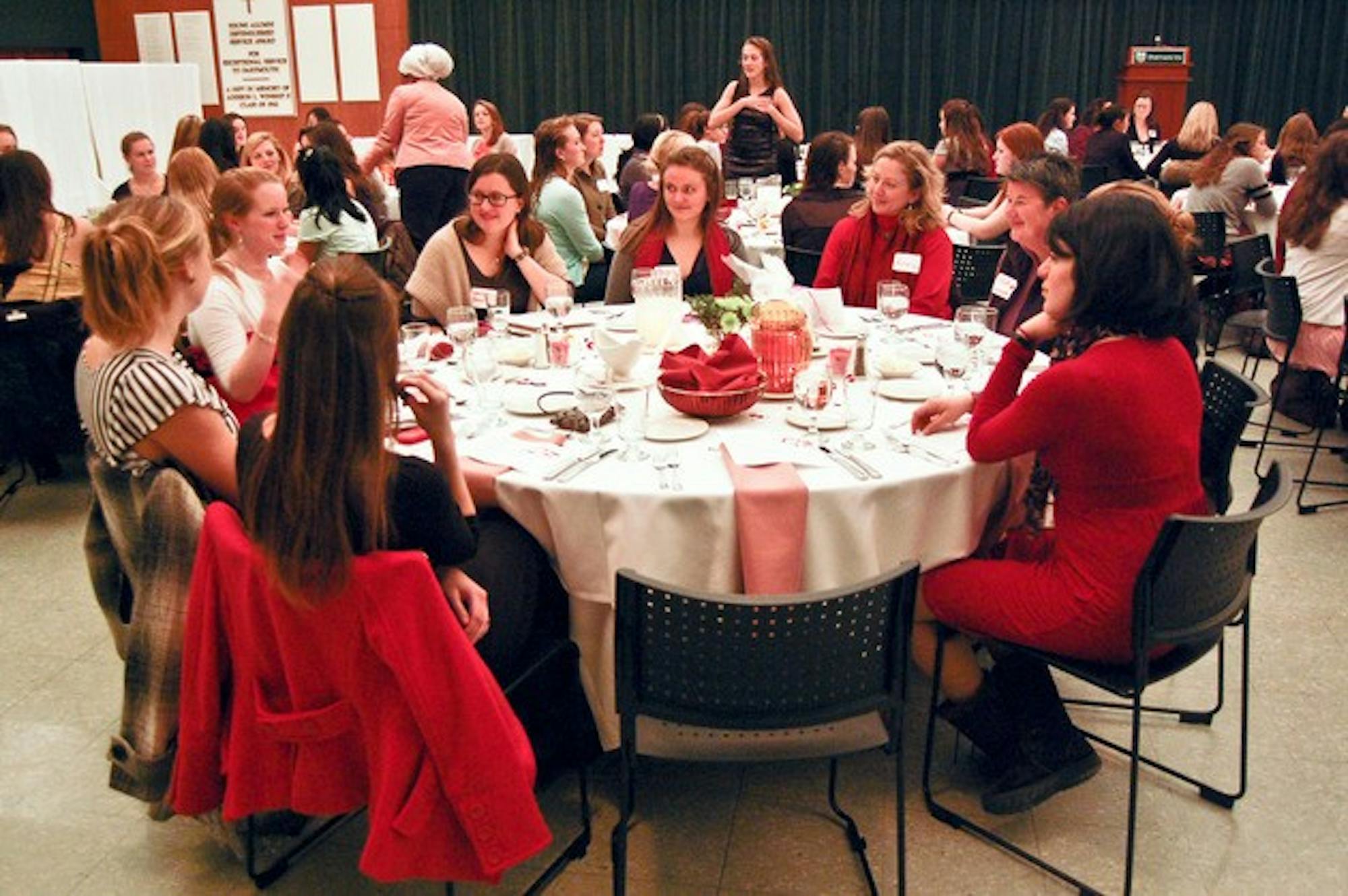Women should band together to achieve sisterhood and "leave men in the gutter," Jennifer Sargent, chief disciplinary counsel for the New Hampshire Supreme Court Attorney Discipline Office and former visiting writing professor at the College, said at the "Proud to be a Woman" dinner on Monday, soliciting laughter from the all-female audience. The dinner which was held in Alumni Hall and organized by the Center for Women and Gender, Link-Up and the V-Time committee marked the beginning of V-Time 2011, the College's annual campaign to end violence against women.
The dinner is one of several fundraising events during V-Time that aim to increase awareness of violence against women, according to Samantha Ivery, acting director of the Center for Women and Gender.
"This year there's been a focus on raising awareness and making the events more accessible," Ivery said. "We want to get more men into the conversations, and more people who would never have thought about it before."
The dinner, which is held each term, drew 150 women from different campus communities, according to Roni Nitecki '11, co-organizer of the dinner and a member of the V-Time committee.
Twelve members of Dartmouth faculty and staff attended the dinner, according to Nitecki.
"We have a fairly even split between [members of each class] and a pretty good representation of campus women as a whole," Nitecki said.
One of the primary aims of the dinner was to facilitate connections between older and younger women on campus, according to Nitecki.
"At Dartmouth, there aren't that many opportunities for older and younger women to meet and discuss and bond with each other," she said. "Female solidarity is one of the most important things you can have, and we're looking to build a network of people who can understand you and sympathize with the difficulties of living on a campus that does have skewed gender dynamics."
Students stationed at each table acted as facilitators who helped guide conversation and provided for continued interaction between the women, Nitecki said.
Facilitators also contact everyone at the table once the dinner is over to make sure that the participants stay connected, according to Nitecki.
During her speech, Sargent offered the female attendees advice on how to interact with each other and said that women at Dartmouth should not turn against one another when men are involved.
"I'm tired of hearing from so many of my wonderful female students that when the lights go down and everyone retreats to the frat basement, we don't band together and instead we claw at each other's necks for those pieces of crap," Sargent said. "We are sisters, and every time we want to put each other down or criticize someone for absolutely no reason other than that we feel smaller than them, we should turn that thinking around."
The "highly educated and promising women" of Dartmouth should work together to improve gender dynamics on campus and build stronger networks of Dartmouth women, Sargent said.
"If we could pool all of our collective resources, we can do so much," she said.
Sargent and Michelle Duster '85, a writer and public speaker who works with communities of women and African American residents in Chicago, were the keynote speakers at the dinner.
The great-grandaughter of early civil rights activist and suffragette Ida B. Wells, Duster spoke about the experiences of women throughout American history.
"When you figure out what your passions are, find someone you know or someone you can read about who can inspire you," Duster said. "So many women have come before us and there are so many inspirational stories that you can find and use as a road map to get though different situations you might be facing."
What her great-grandmother experienced during her lifetime including exile from the South and the effects of the Reformation helped Duster put her own suffering in perspective, she said.
"While you're in school, some things really seem like big problems, but then I would consider them compared to what my ancestor went through," Duster said. "As tough as things might be in your current life, we have to remember that as women in the modern United States, we have so many more rights than women in other countries."
Duster, who attended Dartmouth nine years after the College began admitting women, said Dartmouth men of her generation were not interested in dating smart women.
"My class was the first to be 50 percent women, and at the time the whole school was 70 percent male," Duster said. "The environment was very male-oriented and the school was undergoing a lot of transitions."
Because the "Proud to be a Woman" dinner only admits women, organizers sometimes run into difficulties securing funding, Nitecki said.
"The student activity fee is a part of every student's tuition, so organizations that give out this funding, like Programming Board, can't provide it for a closed event," she said. "Right now, we're mostly funded by the Center for Women and Gender. There's a lot of value in the event being just for women, but that's also what prevents it from getting the most funding."
Tickets for the dinner which began last February as part of V-Time festivities cost $10.
V-Time will culminate with "The Vagina Monologues," a student-run performance that reflects the campaign's global focus on ending violence against women, Ivery said.
This year's production of "The Vagina Monologues" will feature "three or four" monologues written by Dartmouth students, she said.
"I hope that Collis Common Ground is as safely packed as it can be," Ivery said. "We want to increase understanding of what violence against women in a global sense really means, not just through a Western lens."




